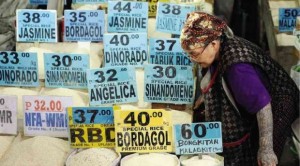Filipinos paying 40% more for rice

A RICE STALL at the Baguio City public market offers different varieties of rice from lowland and upland farms. File photo of EV ESPIRITU
BAGUIO CITY, Philippines – Filipinos are paying 40 percent more for rice because of import controls that make it more expensive for the government to bring in foreign rice to augment local supply, a top economist has said here.
In a lecture on January 28 at the University of the Philippines (UP) Baguio, Professor Ramon Clarete, dean of the UP School of Economics, said that as the National Food Authority (NFA) controlled the importation of rice, Filipino consumers ended up paying higher for the staple than consumers in other countries.
While the NFA’s import controls are designed to protect local rice producers from competing rice exports, Clarete said “this means that if [we buy] imported rice, we will pay 40 percent less.”
“That is the effect of import restrictions,” said Clarete.
Farmers who will benefit from import controls will end up paying higher, too, if they buy imported rice for their families’ consumption.
Article continues after this advertisementClarete’s lecture came just weeks before the Office of the Government Corporate Counsel (OGCC), according to an Inquirer report, issued a legal opinion asking the NFA to first consult with the Department of Foreign Affairs and Department of Trade and Industry before fully enforcing quantitative restrictions (QRs) on rice importation.
Article continues after this advertisementAs a special treatment for the Philippines, the country was exempted from the full liberalization of rice trading under the World Trade Organization (WTO) agreement and was allowed to impose QRs, or volume limits, on rice imports.
But the special treatment had already expired and in its opinion, the OGCC warned that the country could face retaliatory action or suits from other countries part of the WTO if the QRs continued to be imposed.
According to Clarete, while he supported rice sufficiency “if it’s done properly,” the government would have to spend up to P142 billion to make it happen while only P91.4 billion was needed for rice importation until 2016, the target date for the rice sufficiency program to succeed.
He said that to be fully rice sufficient, the country should have produced 4.5 million tons of rice over the life of the program from 2011 to 2016, based on the government’s investment priorities that include extensive irrigation projects.
Using a statistical model to assess the country’s rice self-sufficiency program, Clarete said the government’s rice sufficiency program had a 10-percent chance of success.
Clarete said he used the Arkansas Global Rice Model (AGRM), which measures the amount of public funds allotted for the program against projected rice yield from 2011 to 2016 and the volume of consumption for that period, as well as the impact of extreme weather.
He said the AGRM results should compel the government to review its rice program.
Clarete said the Department of Agriculture failed to attain its rice sufficiency targets for 2013 and had imported up to 15 percent of the country’s rice requirements.
“Self-sufficiency is supposed to be zero imports,” he said.
Clarete also said investing in rice self-sufficiency while maintaining inefficient restrictions on rice imports through the NFA might not be healthy in the long run.
He said the NFA served as a de facto import monopoly. Kimberlie Quitasol, Inquirer Northern Luzon